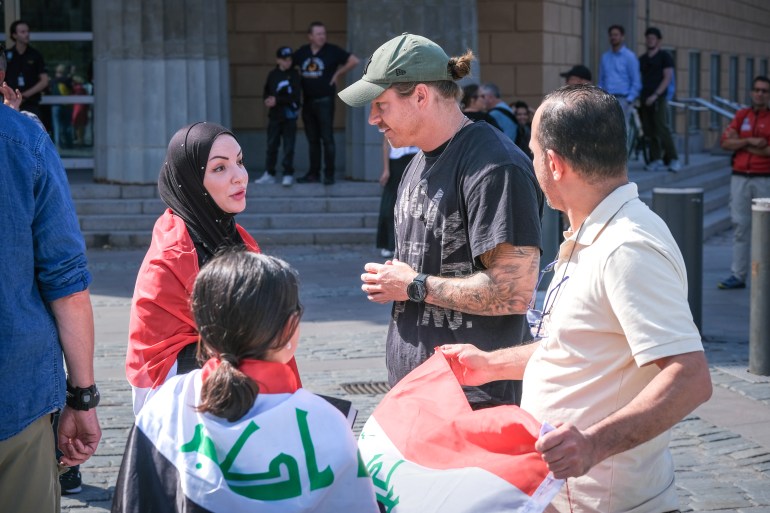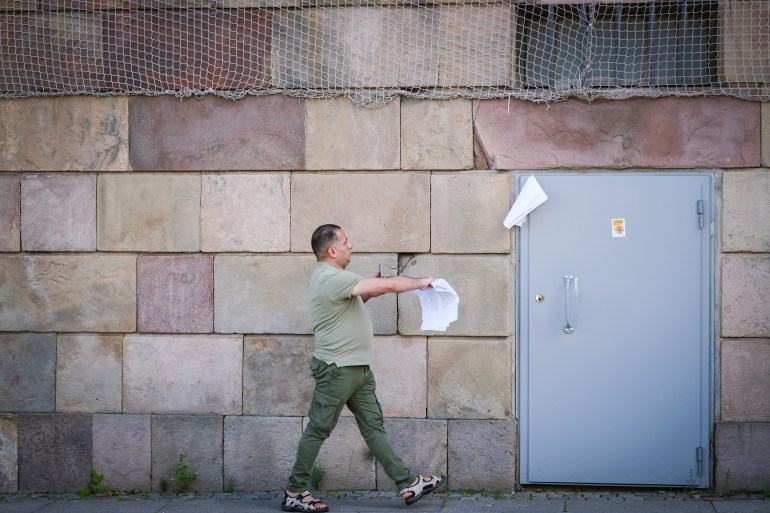Burning the Quran is permitted under Sweden’s freedom of speech laws.
Monday’s incident marked the second time in a matter of weeks that Salwan Momika, 37, and Salwan Najem, 48, have burned the Quran, an act permitted under Sweden’s freedom of speech laws, at Mynttorget, a central square surrounded by government buildings and the palace.
Momika and Najem engaged in a prolonged, theatrical and now familiar desecration of the Quran while using a megaphone to goad counterprotesters.
On Monday, several people in the crowd brought their own megaphones, and the two men were largely drowned out by counterprotesters.

Present among the crowd was a group wearing firefighter-themed outfits whose members chanted “extinguish the hate” while handing out plastic firefighter hats and encouraging onlookers to speak into their megaphones.
Salvaging pages of the Quran
Those granted permission to burn the Quran are allocated a one-hour slot, after which the police disperse them and allow people to collect any remnants of the desecrated holy book.
On this occasion, Momika and Najem had printed multiple pages of the Quran that had text in Arabic as well as translations in Swedish that blew across the square.
After the pair left the area under police escort, several men rushed across the square, picking up the pages from the ground and from the walls leading to the Royal Palace.

Geopolitical ramifications
This year, several Quran burnings have taken place in Sweden and Denmark, prompting outrage in Muslim countries that have demanded the governments of both countries stop to the incidents.
The burnings have caused a diplomatic crisis for Sweden and led to demonstrations in several countries calling for a boycott of Swedish products.
It has also raised security issues for Swedish nationals abroad.
In Iraq, the Swedish embassy was stormed and set on fire last month by hundreds of protesters, mainly followers of the populist Shia leader Muqtada al-Sadr.
On Sunday, the United Kingdom’s Foreign, Commonwealth and Development Office warned Britons from traveling to Sweden over possible terrorist attacks following the burnings, adding that Swedish authorities had successfully disrupted some planned attacks and made arrests.
This month, the Swedish government ruled out any sweeping changes to its freedom of speech laws but repeated it would look into measures that would allow police to stop the burning of holy books in public if there is a clear threat to national security.

Sweden reconsiders Momika’s residence permit
Momika came to Sweden in 2018 and was granted a three-year residence permit in April 2021.
After the first Quran burning, Swedish authorities received information that led to the Migration Agency opening a case to reconsider Momika’s residence permit.
Videos and photos from when he lived in Iraq appear to show he had a leadership role in a Christian militia group that was part of a Shia Muslim umbrella organisation with close ties to Iran.
Momika has also expressed favourable views towards the right-wing, anti-immigration Sweden Democrats party on social media.
Najem emigrated from Iraq in 1998 and became a Swedish citizen in June 2005.
Both men are currently being investigated on suspicion of incitement against an ethnic group.
